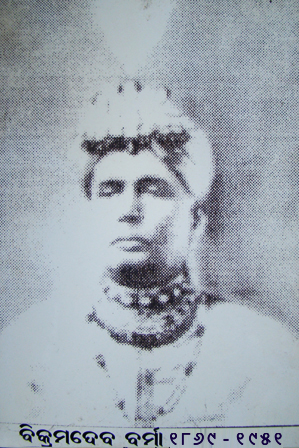Bikram Dev Barma
Died :- 14-Apr-1951
Place of Birth :- Srikakulam Taluk, Andhra Pradesh

An erudite by passion, a philanthropist, famous as a writer and poet, liberal in disposition, Maharaja Bikram Dev Barma was born to Rekha Devi and Maharajkumar Krushna Chandra Dev on 28 June, 1869 in Sri Mukhalingam, Agratalapeta of Srikakulam in Andhra Pradesh. Maharajkumar Krushna Chandra Dev was the junior prince of Jeypore and the younger brother of Maharaja Ram Chandra Dev III who was the 25th king of the Suryavansh dynasty that ruled over Kalinga and later Jeypore under the British.
A patron of arts and literature, Maharaja Bikram Dev Barma was also a writer and playwright. Besides, he was an administrator, a magistrate for Visakhapatnam, appointed by the Madras government in 1914. He was deeply involved in the movement for protection of Odia language and the creation of Odisha as a separate state by way of unification of Odia speaking regions lying scattered in Bihar, Bengal and Madras.
Due to a family quarrel Krushna Chandra stayed away from Jeypore in the village of Sri Kurmam in Srimukhalingam, Andhra Pradesh (then under the Madras Presidency). Bikram Dev’s mother died when he was nine and his father died six years later. He was adopted by the Queen of the Matsya Dynasty of Madugula and was known as Madugula Raju. Although this adoption was challenged in court in 1881, the judges retained its validity. He learned English from J.S. Bard at Vizag and became an expert in Telugu, Odia and Sanskrit. He became a writer in all these languages and was awarded an honorary Doctor of Literature and made a Sahitya Samrat by the Andhra Bharati Tirtha Research University on 6 May, 1933. He married the daughter of Sulochana of Nawrangpur who belonged to the royalty of Patna. A philanthropist, he donated to the cause of Andhra University and helped establish various cultural and educational institutions.
Long before he was crowned as the king of Jeypore, Bikram Dev was a renowned scholar who gained expertise in six languages – Sanskrit, Hindi, Odia, Telugu, Bengali and English. He acquired enough fame through his contribution to the combined literature of all these languages.
He wrote Telugu plays like ‘Shree Nivas Kalyan Natak’, ‘Krushnarjuna Charitam’ and ‘Manavati Charitam’ that were staged in the iconic ‘Jaganmitra Hall’ established by the king himself, which was seen as a noble attempt to flourish art and culture among the populace of the city. He annually invited and honoured 100 learned scholars from all over India.
Bikram Dev donated two million rupees to fund the Andhra University which was ordered to be shifted to Guntur. He was one of the main writers of newspapers and Journals such as Nav-Bharat, Sahakar, Navin, Shishir etc. He also contributed to the religious writings by authoring ‘Bhagawad Gita Mahatmya’, his first writing in Odia and ‘Sarasa Gitavali’ in his youth. He also wrote many Stotras, Kavacham and Chautisha etc. He served as the pro-chancellor of Utkal University and Andhra University.
Bikram Dev Barma contributed more to education than any other king in the region of Kalinga (South-east Odisha & North Andhra). He did not only save Andhra University by donating millions but also made sure that it is well established and efficient for his subjects. Therefore, he donated one lac rupees annually to the University. He donated one lac thirty thousand rupees to the S.C.B. Medical College at Cuttack and few thousand rupees to Utkal University for post-graduate scholarship.
A major portion of his donations was spent in laying the foundation of the first theatre hall of Visakhapattnam, known as ‘Jaganmitra Hall’ and Jeypore College of Technology and Science. He founded an arts and crafts school named after his first cousin Maharajah Bikram Dev III KCIE in Jeypore which is now a government college. He bore all the cost of publications for some renowned writers that he interacted with in his time as the chancellor.
Bikram Dev had attained the pinnacle of reputation in India as a noble administrator and a committed educationist, who inspired other administrators in the country, and died on 14 April, 1951 leaving behind a rich legacy for posterity.
Books
Poetry
Copyright © 2024 Odia Virtual Academy. All rights reserved Total Visitors- 1
Powered by: Odia Virtual Academy

